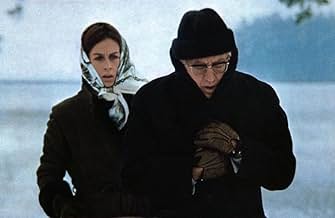Añade un argumento en tu idiomaWhen a German businessman causes a car accident with deadly consequences, the papers start digging into his past to find scandals. What they find causes him to reevaluate his own past during... Leer todoWhen a German businessman causes a car accident with deadly consequences, the papers start digging into his past to find scandals. What they find causes him to reevaluate his own past during WW2 when he was in Greece.When a German businessman causes a car accident with deadly consequences, the papers start digging into his past to find scandals. What they find causes him to reevaluate his own past during WW2 when he was in Greece.
- Nominado para 1 premio Óscar
- 4 premios y 2 nominaciones en total
Walter Varndal
- Dr. Kratxer
- (as Walter von Varndal)
Argumento
¿Sabías que...?
- CuriosidadesMargarete Schell Noé (Frau Buchmann) was the mother of the writer, director and star Maximilian Schell (Andreas Giese).
- ConexionesReferences Un condenado a muerte se ha fugado (1956)
- Banda sonoraSymphony No. 7 in A major, Op. 92
Written by Ludwig van Beethoven
Played by the Berliner Philharmoniker
Conducted by Herbert von Karajan
Reseña destacada
Initially it was my intention to dedicate my month-long Oscar marathon to catching up solely with winners but the sudden passing of Austrian actor/writer/director Maximilian Schell on its very first day soon dispelled those plans! Schell, already an acting Oscar winner at the start of the 1960s, went behind the camera towards the end of that same decade and his directorial debut – FIRST LOVE (1970) which, sadly, is unavailable for viewing at this juncture – immediately earned him a Best Foreign Language Film Oscar nomination; the film under review is his sophomore effort and it was equally recognized by the Academy and, even though it lost out to François Truffaut's delightful film-making classic DAY FOR NIGHT (1973) on this occasion, it emerged victorious at the Golden Globes.
Bringing former Nazi officials to justice has been an ongoing worldwide quest ever since the 1947 Nuremberg trials; it is perhaps not coincidental that Maximilian Schell not only won his sole acting Oscar for a fictional, star-studded reenactment of that infamous event but that he tackled the subject again when he became a director. Curiously enough, while he does appear as an actor in THE PEDESTRIAN, his is only a star cameo as the dead son of a German industrialist targeted by his surviving Greek subjects 30 years after the retaliatory massacre of their village populace. However, Schell did appear as hunted ex-Nazis in such Hollywood indictments as THE ODESSA FILE (1974) and THE MAN IN THE GLASS BOOTH (1975; which garnered him another Best Actor nod and a viewing of which will follow presently) before essaying yet another proud Nazi officer in Sam Peckinpah's CROSS OF IRON (1977).
The central character of THE PEDESTRIAN – so called because his reckless steering costs him his driving license and the life of his son (Schell) – is played by Gustav Rudolf Sellner and, although it is the first time I have heard of him or seen his work (in fact, this was his screen debut in that capacity as he is also a director of TV movies), his sensitive portrayal is a quietly impressive one that was recognized at that year's German Film Awards; typically, he is shown leading a double life even on a personal level by keeping a much-younger mistress! Amusingly, at one point, Sellner's younger, rebellious, hippie son is also shown catching a TV screening of the classic Bolivian film BLOOD OF THE CONDOR (1969). Schell's treatment of the somber material (including potentially disturbing footage of road accident victims which the felonious drivers are forced to watch as part of their 'rehabilitation' process!) is predictably heavy-going if occasionally brilliant, relying on several flashbacks to the all- important WWII and car crash episodes. Even so, the unexpected highlight of the film turns out to be a couple of sequences set in an old people's home where Sellner's wife reminisces with her elderly friends that are (unaccountably but delightfully) played by such acting veterans as Peggy Ashcroft, Elizabeth Bergner, Lil Dagover and Françoise Rosay! ...
Bringing former Nazi officials to justice has been an ongoing worldwide quest ever since the 1947 Nuremberg trials; it is perhaps not coincidental that Maximilian Schell not only won his sole acting Oscar for a fictional, star-studded reenactment of that infamous event but that he tackled the subject again when he became a director. Curiously enough, while he does appear as an actor in THE PEDESTRIAN, his is only a star cameo as the dead son of a German industrialist targeted by his surviving Greek subjects 30 years after the retaliatory massacre of their village populace. However, Schell did appear as hunted ex-Nazis in such Hollywood indictments as THE ODESSA FILE (1974) and THE MAN IN THE GLASS BOOTH (1975; which garnered him another Best Actor nod and a viewing of which will follow presently) before essaying yet another proud Nazi officer in Sam Peckinpah's CROSS OF IRON (1977).
The central character of THE PEDESTRIAN – so called because his reckless steering costs him his driving license and the life of his son (Schell) – is played by Gustav Rudolf Sellner and, although it is the first time I have heard of him or seen his work (in fact, this was his screen debut in that capacity as he is also a director of TV movies), his sensitive portrayal is a quietly impressive one that was recognized at that year's German Film Awards; typically, he is shown leading a double life even on a personal level by keeping a much-younger mistress! Amusingly, at one point, Sellner's younger, rebellious, hippie son is also shown catching a TV screening of the classic Bolivian film BLOOD OF THE CONDOR (1969). Schell's treatment of the somber material (including potentially disturbing footage of road accident victims which the felonious drivers are forced to watch as part of their 'rehabilitation' process!) is predictably heavy-going if occasionally brilliant, relying on several flashbacks to the all- important WWII and car crash episodes. Even so, the unexpected highlight of the film turns out to be a couple of sequences set in an old people's home where Sellner's wife reminisces with her elderly friends that are (unaccountably but delightfully) played by such acting veterans as Peggy Ashcroft, Elizabeth Bergner, Lil Dagover and Françoise Rosay! ...
- Bunuel1976
- 3 feb 2014
- Enlace permanente
Selecciones populares
Inicia sesión para calificar y añadir a tu lista para recibir recomendaciones personalizadas
Detalles
- Fecha de lanzamiento
- Países de origen
- Idiomas
- Títulos en diferentes países
- The Pedestrian
- Localizaciones del rodaje
- Empresas productoras
- Ver más compañías en los créditos en IMDbPro
- Duración1 hora 38 minutos
- Mezcla de sonido
Contribuir a esta página
Sugerir un cambio o añadir el contenido que falta

Principal laguna de datos
By what name was El peatón (1973) officially released in India in English?
Responde





















